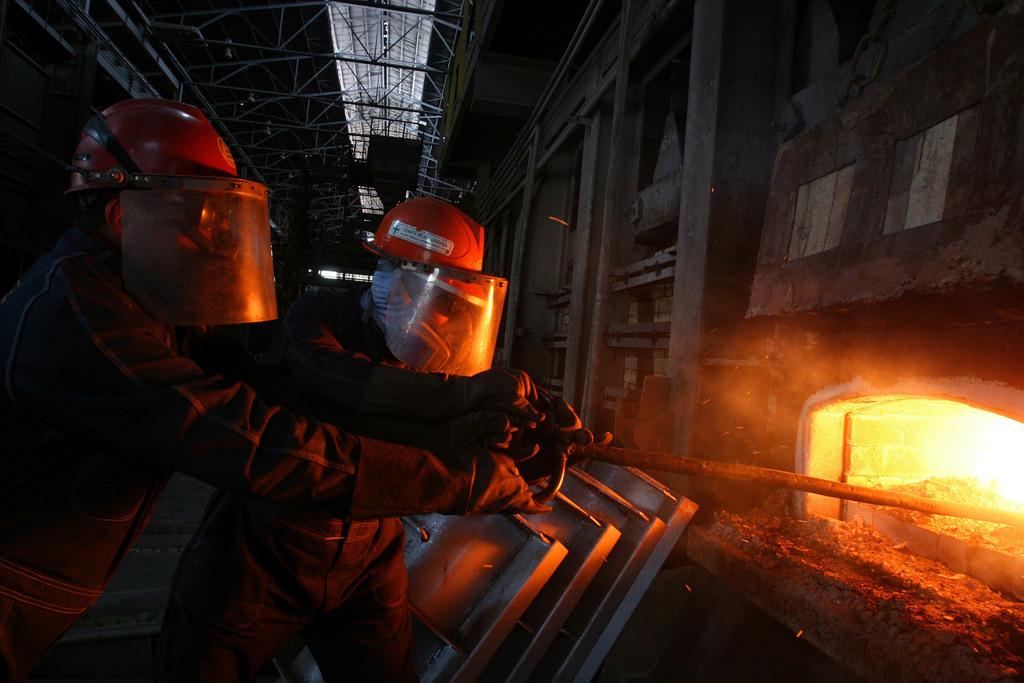‘Don’t panic’ call accompanies China stock slump

Swiss analysts have urged investors and companies to stay calm as Chinese stocks plummeted sharply again on Monday, with the reverberations of events in the world’s second largest economy being felt across the globe.
The Swiss stock market opened 3.3% lower after the value of China stocks fell 8.5% at the close of trading following a poor showing last week. Some observers have viewed the slump as indicative of fundamental weaknesses in a Chinese economy that is attempting to wean itself off state debt and into a phase of consumer growth.
But others, including Joachim Klement at consultancy firm Wellershoff & Partners, believe the current bear market is mainly being driven by irrational investor fear. “We don’t see any signs of a hard landing for the once high-flying Chinese economy,” Klement told swissinfo.ch. “The stock market losses are clearly sentiment driven at the moment.”
“We don’t see a long-term decline as long as this sentiment does not lead to declining investor and consumer spending in Western Europe and the United States,” he added. “The best thing that the Chinese government and investors can do is to keep calm.”
The fall in share prices in China has been accompanied by a fall in commodity prices over the last few months. The price of oil has fallen to its lowest levels since 2009 while a range of other commodities has also slumped amid fears that Chinese demand for raw materials will slow.
Those Swiss-based commodities companies that are listed on stock exchanges were quick to see the effects of the double whammy. London-listed shares of Zug-based GlencoreXstrata fell more than 5% in early morning trading, adding more misery to the company that recently revealed a 29% drop in first half earnings and reduced its profit outlook for 2015.
Shares in Transocean were the hardest hit of all companies listed on the Swiss SMI index, also dropping by more than 5% in the morning’s trading.
Supply and demand fundamentals
However, the news is not all bad for the industry, which has a large presence in Switzerland, according to Julius Bär bank commodities analyst Warren Kreyzig who also believes that market sentiment is playing a significant role in developments.
Kreyzig believes that demand for raw materials, including from China, will remain robust. The fall in prices is more down to an over-supply of commodities that has failed to cool down from the “super cycle” period of massive demand in the last few years.
“We may start to see an acceleration of supply cutbacks [mining firms slowing down the rate of extraction],” he told swissinfo.ch. “But it remains to be seen if this pullback will occur at a sufficient pace to rebalance the markets.”
“The market is currently not giving sufficient consideration to the fundamentals of supply and demand. It is not easy to for a company that has recently invested heavily in new projects to pull the plug on them.”
On July 1, Switzerland celebrated the first anniversary of its free trade agreement with China. Between July 1, 2014 and the end of May this year exports to China (excluding gold bars and jewellery) had increased 3%, a much faster rate than to the rest of the world, according to a Swiss government communiqué last month.
But customs figures show that the rates have declined in the last six months, with exports to China registering a 1.6% rise compared to 2014 and imports from China by +0.8%. In the first six months of 2014, exports rose 12.4% compared to the same period in 2013 and imports by 6.1%.
Last week, the lobby group Swissmem – that covers the electrical engineering, metal working, precision tools and machine building industries – said that exports to China from its members had fallen -8.8% in the first half of 2015.
Nicolas Musy, co-founder of the Shanghai-based China Integrated consultancy, told swissinfo.ch that not too much should be read into those figures. Whilst acknowledging that the Chinese economy had slowed from double digit growth in recent years, Musy pointed out that a projected 6.8% GDP growth this year was still “enormous” by global standards.
Musy believes that the Chinese stock market was due a cooling off having become “over-valued”. “The stock market accounts for only a fraction of the wealth accumulated by the people of China,” he said. “Even if markets are going down, it will not have any impact on consumer spending.”
“There is no fundamental reason that any Swiss company operating in China, or one thinking about entering this market, should change their plans. The stock market slump is not a true reflection of the concrete situation in the Chinese economy.”

In compliance with the JTI standards
More: SWI swissinfo.ch certified by the Journalism Trust Initiative



You can find an overview of ongoing debates with our journalists here. Please join us!
If you want to start a conversation about a topic raised in this article or want to report factual errors, email us at english@swissinfo.ch.